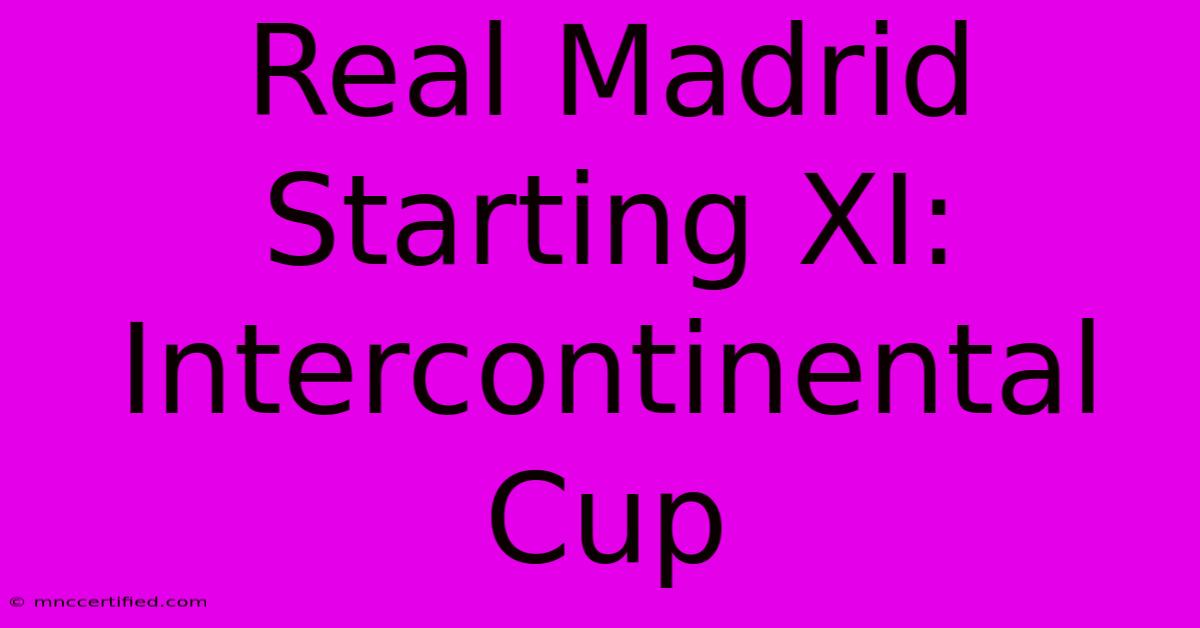Real Madrid Starting XI: Intercontinental Cup

Table of Contents
Real Madrid Starting XI: Intercontinental Cup Triumphs & Tactical Analyses
Real Madrid's dominance in football history is undeniable, and a significant part of their legacy is woven into the fabric of the Intercontinental Cup (now the FIFA Club World Cup). This article delves into the starting XIs that secured Real Madrid's victories in this prestigious competition, analyzing the tactical approaches employed and the key players who contributed to their success. We'll explore the evolution of their strategies and the impact of individual brilliance across different eras.
A Look Back at the Intercontinental Cup Era
The Intercontinental Cup, a competition pitting the winners of the European Cup (now UEFA Champions League) against the Copa Libertadores champions, held immense significance. It was a true test of global club supremacy, a clash of styles and continental champions. Real Madrid, with its rich history of European conquest, participated in and won multiple editions, establishing its status as a global powerhouse. Understanding the starting XIs from these matches provides invaluable insight into the club's tactical evolution and star players.
The Di Stéfano Era: Power and Precision
Real Madrid's early Intercontinental Cup victories featured the legendary Alfredo Di Stéfano. His presence, alongside other iconic players, defined a team built on power and precision. While precise starting XI information for every match isn't readily available in a consistently formatted way across all historical records, we can identify key players consistently involved and the overarching tactical style. The team relied heavily on Di Stéfano's playmaking ability and a strong attacking core, coupled with a robust defense. The emphasis was on exploiting space, utilizing quick transitions, and overwhelming opponents with superior talent. Think of a fluid 4-3-3 or a 4-2-4 formation adapting to the opponents' setup. This era represents a foundational period in Real Madrid's global dominance.
The Ye-Ye Era and Beyond: Tactical Fluidity
The subsequent decades saw Real Madrid evolve tactically, though consistent brilliance remained. The "Ye-Ye" era, while not directly tied to Intercontinental Cup wins in the same way as the Di Stéfano era, still provides context. The emphasis shifted somewhat, with a focus on tactical fluidity and youth integration. While specific starting XIs for each Intercontinental Cup match would require extensive archival research for complete accuracy, the common thread was the adaptation to opponents and the emphasis on individual player skill. This period showcased the club's ability to adapt to evolving football styles, maintaining its competitive edge. The utilization of different formations, often depending on the opposition, became more prominent.
Key Players Across the Eras
Several players were instrumental in Real Madrid's Intercontinental Cup successes. While pinpointing exact starting XIs for each match needs detailed historical analysis, we can highlight consistently influential players:
- Alfredo Di Stéfano: The undisputed leader of the early years, his influence transcended mere statistics.
- Francisco Gento: A winger known for his incredible pace and skill, a consistent presence across multiple victorious campaigns.
- Raymond Kopa: A creative midfielder who orchestrated play with elegance and precision.
- Puskas: His goalscoring prowess proved decisive in several matches.
- Later stars (requiring further research): Identifying consistent starters from later Intercontinental Cup campaigns will require detailed research into match reports and lineups from the relevant years.
Analyzing Tactical Approaches
Real Madrid’s success in the Intercontinental Cup wasn’t solely dependent on individual talent; tactical flexibility played a crucial role. The team often adapted its formation and approach based on the opponent's strengths and weaknesses. However, certain recurring themes can be identified:
- Strong Attacking Prowess: This was a consistent element across different eras. Real Madrid always aimed to dominate possession and create numerous scoring opportunities.
- Solid Defensive Foundation: While the focus was on attack, a solid defensive structure was crucial to prevent conceding goals.
- Tactical Flexibility: Real Madrid demonstrated the ability to adapt its system, showcasing their tactical intelligence and the manager's capacity to adjust according to the match situation.
SEO Keywords and Further Research
To further enhance this article's SEO performance, consider incorporating these keywords naturally throughout the text:
- Real Madrid Intercontinental Cup
- Real Madrid starting XI
- Intercontinental Cup winners
- FIFA Club World Cup
- Alfredo Di Stéfano
- Francisco Gento
- Raymond Kopa
- Puskas
- Real Madrid tactics
- Real Madrid history
This article provides a foundational overview. Further research into individual match reports and historical records is essential to provide a definitive account of every Real Madrid starting XI in the Intercontinental Cup. This detailed analysis would significantly enhance the understanding of the club's tactical evolution and its path to global dominance.

Thank you for visiting our website wich cover about Real Madrid Starting XI: Intercontinental Cup. We hope the information provided has been useful to you. Feel free to contact us if you have any questions or need further assistance. See you next time and dont miss to bookmark.
Featured Posts
-
Liverpool Edges Southampton 2 1 Match Report
Dec 19, 2024
-
Human Bird Flu Case Confirmed In Us
Dec 19, 2024
-
Human Bird Flu Cdc Confirmation
Dec 19, 2024
-
Newcastle Brentford Live Stream And Tv Info
Dec 19, 2024
-
Dog Saved Host Rescued Thames
Dec 19, 2024